
There are many moving parts and responsibilities when running an online store. The day-to-day operations make dedicating time to back end marketing tactics hard to prioritize, but those that do silently reap many rewards. Link building for ecommerce websites is a critical back end strategy that plays a vital role in SEO for your ecommerce store.
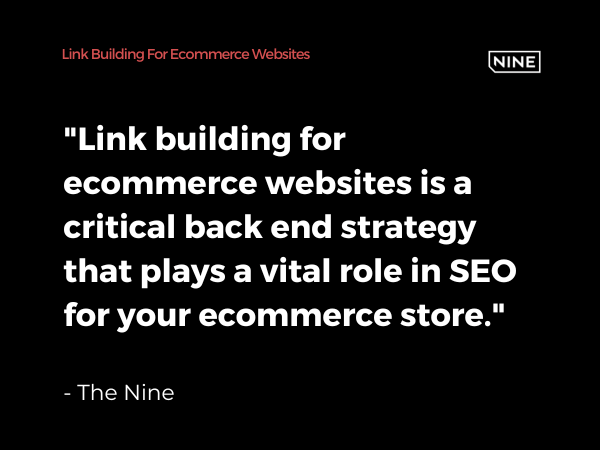
Why Backlinks Matter
Inbound links signal to Google that websites consider your online store reputable and worthy of website traffic. Google jumps in on this digitized form of social proof to see what’s happening at this “talked about” location. Backlinks keep Google on your website for further analysis, where they scan your page for topics and keywords for ranking consideration.
But contrary to what spam emails might state, inbound links are not all created simultaneously. We can separate spam, low-value, and high-quality links based on a few factors.
- Domain Rating / Domain Authority: The quality and quantity of backlinks a site links to you will determine the strength of its backlink.
- Outbound links: Taking DR/DA into account, when a referring site has thousands of outbound links, it has less impact on your search engine rankings.
- Site Traffic / Page Traffic: Websites with lots of backlinks, but little website traffic won’t help your SEO much. You want websites with a strong DR/DA and consistent website traffic or, better yet, the page where they’ve placed your link.
One aspect of backlinks that many SEO’s forget is how they generate sales. We get so caught up in search engine optimization we forget how backlinks are a traffic source for generating revenue—much like how structured project planning methods ensure every initiative is aligned with measurable business outcomes. Using reliable SEO link building tools can help identify, manage, and acquire high-quality backlinks efficiently. Further along in this article, we discuss how ecommerce link building should include transactional backlinks besides text anchor text.
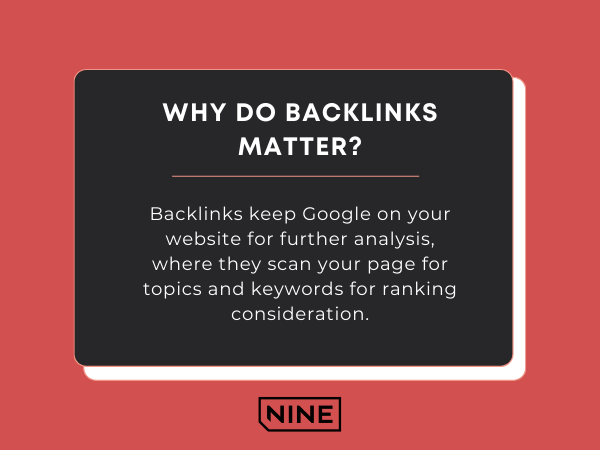
The Elements of a Backlink
A quality backlink carefully considers each hyperlink aspect of ensuring it’s set up for maximum SEO potential.
URL: This may sound silly, but set the URL to the referring page where it should go.
Anchor Text: We increase rankings for specific keywords by creating links around the primary subject. We then request the anchor text to match the target keyword. For example, if you link to this article, please use “link building for ecommerce websites.” We would appreciate it! :)
URL Attribute: Respecting Google guidelines is important, and we should build backlinks according to their policies. For our backlink building strategy, we want as many quality dofollow backlinks as possible.
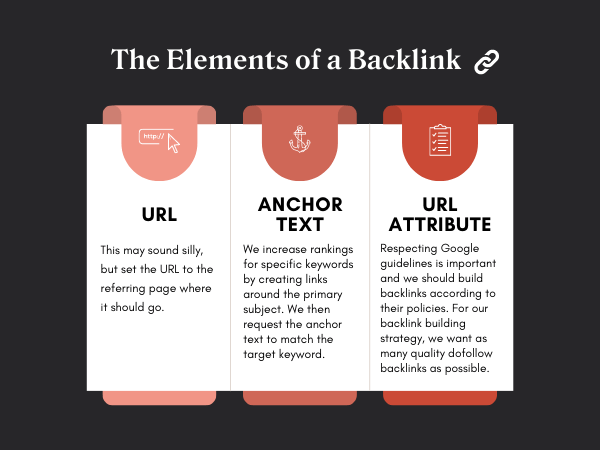
The Ecommerce Link Building Quick-Start Guide
If your ecommerce website is already in business, there’s a good chance that your initial brand awareness through referrals or marketing establishes the opportunity to build backlinks. Let’s get into some of the quick wins available to your existing business.
Brand Mentions
Hopefully, your brand is being talked about online. While it would be nice if they did, not always brand mentions are attached to a hyperlink pointing to your website. The first step to any backlinking strategy for an ecommerce site is researching brand mentions and reaching out to website owners or those in charge of online content.
You can do this by going to google and using the exact match search modifier by simply putting your company name in quotations, such as “The Nine.” As you can tell, our agency name isn’t unique enough for the exact match search to work. Instead, we should use longer tail terms that websites used to mention our agency.
“The Nine Agency”
“The Nine Digital Marketing Agency”
"The Nine Ecommerce Agency"
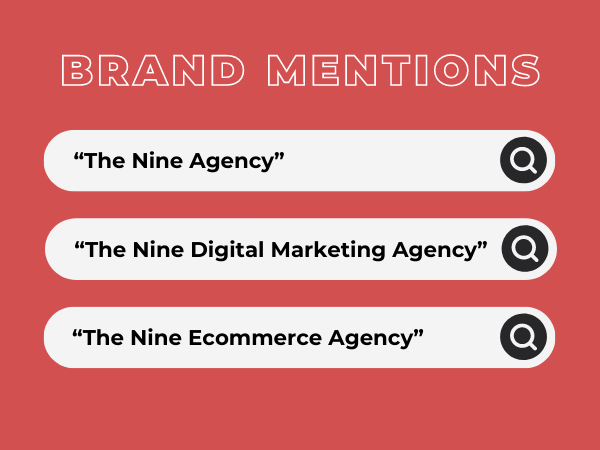
To prevent you from remembering this manual process, create a google alert for each term and receive emails when a website creates an online mention. At The Nine, we use more advanced SEO tools for monitoring, allowing us to identify additional opportunities for brand-mention link placements.
Social Media Profiles
We’re confident that you already understand the importance of social media for your online store. But did you know that social media signals Google about the continuous conversation within your company? Since each social media platform allows you to add your website link, we can see why they consider social links to determine your search engine results.
So if you have inactive social media accounts, they may lower the worth of each social media backlink.
Online Directories
We understand the importance of creating and maintaining online directories for our local SEO clients. These online mentions signal to Google how your company is real by matching your name, address, and phone number across various websites.
Isn’t this even more important for online websites without a stronghold in their local community?
While most online directories provide NoFollow links within their site, many SEO experts still believe they have value in search engines. Online directories are a numbers game, so existing across hundreds of websites might be the tipping point required to push past your competition.
Online directory listings come at a small cost; it’s worth finding them, building them, and monitoring them. Don’t worry; we do that for you.
Link Building For Product Pages
Most product pages on a website are boring and lack a true page experience. Ecommerce sites heavily invest in their home page design, leaving the product page to theme settings and including a basic description. Taking this approach to a product page is a mistake for every ecommerce business.
For building backlinks, your product pages have many opportunities, but when your product page is lackluster, websites have no reason to send people to your page.
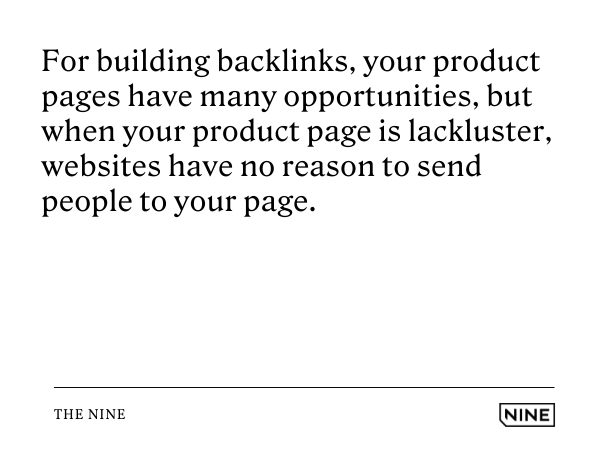
Having harped on the on-page SEO for your product pages for long enough, let’s look at how you can build backlinks to your product pages.
Video Link Building (make this a standout)
Note: We can apply the following strategies to video link building. Much of the same content exists on YouTube and other video platforms. While Google treats the link differently, it’s worth exploring the same content in a video format for additional social links. Since Google owns YouTube, it makes sense why they consider link building within the second largest search engine to be important for organic SEO rankings.
Best of Websites
Are there other products like yours on the internet? There’s a good chance you said yes to this question, so your product qualifies for becoming one product on a “best of” page.
- Search “best (product name)” and similar terms: A simple Google search with these terms yields plenty of results. Create a pitch in advance and custom-tailor the message to each website. Tell them why your product is important and ask them to consider your product on their list.
- Look at competitor backlinks: Link acquisition through competitive analysis is something we take seriously at The Nine. Building links is a dirty process, but it doesn’t have to be complicated. Looking at your competitors to find where they exist on “best of”, “top-rated”, and other product listicles is less work with better results.
Sometimes, these will be affiliate sites, which means you will not get a true DoFollow link, but it still holds weight and you might get referral traffic and sales. In the end, that’s what we are after, anyway? Right?
Product Type Mentions
While every excellent product solves a problem, in most cases, they are a part of a larger sum. The category your product is a part of gets mentioned in “how to” articles, where a blog post discusses multiple steps to achieve a goal.
When you build links for ecommerce websites, think about what you're selling. Let’s say you sell a one-of-a-kind sock. Articles on the internet about “dressing to impress” are widespread. In these articles, they discuss an entire wardrobe.
Your socks might be the right fit for this article, but not if your product doesn’t exist to them. Without outreach on your company's part, it’s unlikely these articles will link to you.
Since not every website owner wants to update their articles (but they should!), we can find “urgent” reasons to drop your link in. The best way is through broken link campaigns, finding articles mentioning products that no longer exist or have the wrong URL.
Since most understand fixing broken links as technical SEO best practice, the website owner is inclined to thank you by replacing dead external links with yours.
Product Use Articles
Put in the right person's hands, creative use of a product is a fun and stimulating process. Returning to the scenario of an ecommerce site selling socks, even a straightforward product has a wide range of topics to cover. Here are a few examples to try on.
- How To Put Shoes On Without Damaging Your Fancy Socks
- The Right Way To Wash Your Stylish Socks
- How to Tell Which Is the Left and Right Sock
This thinking can help you break through older, more established companies using traditional marketing methods. Even if your outreach does not land a link, it creates a relationship that can become a future link. Like many aspects of SEO, it’s important to think of link building as a long-term game.
Link Building For Category Pages
Ah, the forgotten category pages. Most ecommerce sites leave the category page to fend for itself. Often, these pages have thin content and poor page structure.
Thin content: A page devalued by Google because it has minimal words, typically below 300.
If you want to win at SEO, we should optimize every indexed page for content and backlinks. The best use of a category page is capturing each category branch with punchy sentences. Category pages should be short but full of insights and expertise. Here are a few category page examples that can lead to backlinks.
- We have over 500 premium water bottles for you to choose from.
- Below you will find our best-selling vitamins from most to least popular.
- We have segmented our coffee selection based on preferred brewing methods.
When creating category pages, do so in a way that makes it easy to link to. Then, find your way into conversations where your category content is the right fit.
Link Building For Articles
Ecommerce content marketing includes four key components.
- Topic Coverage: How detailed and on-topic is the article?
- Topic Authority: How many articles speak to the principal topic?
- Website Authority: How many links are pointing to the site?
- Page Authority: How many links are pointing to the page?
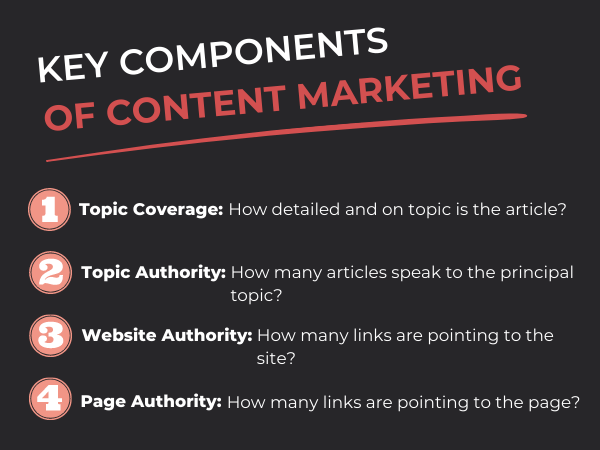
Within these frameworks are rankings factors such as the writer's E.A.T. score (expertise, authority, trust), meta information, grammatical structure, and on-page experience.
The fastest way to gain backlinks through content marketing is to have your product page, category page, or blog post sit at the top of the search engine. When people search for links, they often do a Google search and choose the top performer. This often disappoints smaller companies who don’t stand a chance against the industry giants, but don’t worry; we have plenty more link-building strategies to unpack.
Cover New Topics
Approximately fifteen percent of searches performed daily are new to Google. Not a slim number by anyone’s standards, there’s considerable opportunity to write content about topics people will eventually search for. You are primed for this type of content once your level of expertise reaches a point where you can predict the questions people ask.
That is exactly why our ecommerce SEO agency believes heavily in strategy sessions with our clients.
Statistics Pages
Blog writers love linking to statistics. It makes their article appeal more “credible” in readers' eyes. The problem is that many online stores falsely assume that statistics are for companies that employ statisticians or researchers.
Any website with access to, or can ask for, data can build a statistics page. Ecommerce brands have numerous opportunities for creating statistic pages on their websites.
Existing Orders: The backend of your website is a goldmine for statistics. Here are a few examples to get you started.
- 50% of our customers purchase laces to match their socks.
- 90% of customers who buy this vitamin sign up for the auto-refill.
- Here you will find the purchase percentage for each water bottle brand we carry.
Social Media Polls: If you have an existing audience on social, you have access to polls. Here’s a short list of social media platforms where you can capture statistics.
- TikTok
Email Marketing: Creating an ecommerce email marketing campaign is an opportunity to create deeper statistics through email marketing surveys. You can segment your audience into three distinct categories.
- New customers that have your company fresh in their minds.
- Loyal customers that Kevin Kelly considers to be true fans.
- People who are interested in a specific email subject.
FAQ Pages
Resource pages such as FAQs (frequently asked questions) can successfully build backlinks, especially when you capture the knowledge panel or land in the “people also ask” section. Remember how we discussed the number one position being the most attractive for building backlinks? Well, when your questions become featured by Google, they perfectly position you for snagging backlinks.
Linkable Assets
While topical authority is still the focus of any good content marketing plan, linkable assets take a dead aim at building backlinks. Within the linkable asset, you can include internal links back to your topic pages, helping to gain traction with your priority pages.
What is a Linkable Asset?
A linkable asset is a piece of content (article, video, images) created primarily intending to build backlinks from referring pages.
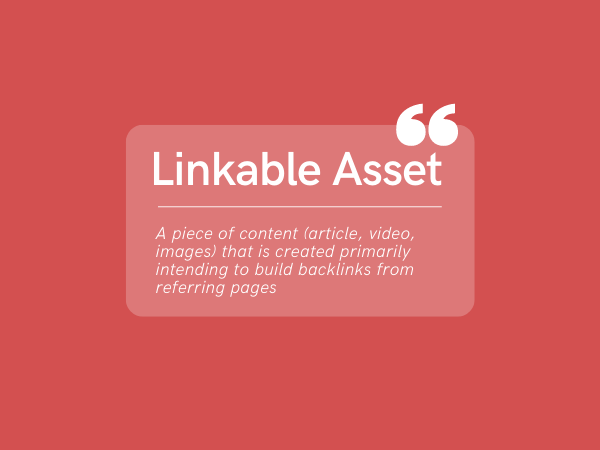
Here are a few examples of linkable assets that help you build backlinks.
- Interesting use pages: A water bottle retailer might create an article about 7 ways to repurpose a used water bottle. Using bottles for science experiments, a piggy bank, or gardening.
- Timely Pages: Home Depot does a great job of this, and this Halloween skeleton article is a perfect example.
- Satire pages: Have a little fun with your products and find creative ways to make them less boring.
Sometimes linkable content needs a head start, so consider sharing them on social media to create quick exposure and page traffic.
Ecommerce Link Building Strategies
We asked the team at The Nine to put together a list of creative link-building strategies for ecommerce websites. Here’s what we came up with.
- Think Viral: creative content worth linking to follows a similar approach to creating viral content on social media. Sure, SEO moves slower than social media, but we need the same level of effort for people to mention a page on your website.
- Association Sponsorships: Backlinks from a nonprofit are extremely valuable. If you donate to associations, charities, or other types of nonprofits, ask for your logo and link to be included on their website.
- Give Your Product Away: People love free stuff, and we can build backlinks through bloggers by giving away your product. Unless your product costs more than a few hundred dollars to produce, you save money compared to other forms of link building.
- Use Social Media Images: Your creative team is taking the time to design beautiful images that customers will soon forget. Why not let them live forever and keep them in a place where bloggers might swipe them and give you credit as a backlink? Photo ecommerce is a big deal since Google Lens continues to develop, so these photos also help you rank in Google’s growing image search.
- Internal Link to Non-Linkable pages: Look, we should optimize every page for SEO, but with that said, even though they are important, some pages won’t be clickable. Internal linking is how you can show Google the importance of these non-link-worthy pages.
- Work Your Network: Who do you know within your industry but not compete against your product? These website owners can become link-building partners. From your brother to someone you met at a conference, ask for a link, but be sure to add more value than the link is worth.
- Create a Linkable Discount: No, spammy coupon companies do not provide valuable backlinks to your website. However, the right coupon with the right message might. You can even match a hashtag with a discount. In fact, while we are here, you can get a keyword ranking predictability audit and receive a 10% discount with code: predictableseo
- Affiliate URL vs. Affiliate Tracking: In certain cases, such as podcast sponsorships and high-profile bloggers, capturing backlinks with an affiliate URL rather than tracking code makes sense. A backlink from Tim Ferris could be a game-changer to search rankings, and missing out on this opportunity would be crazy.
Best Practices For Building Backlinks
In most cases, we should follow rules and interrupt patterns. When building backlinks, sometimes creating a backlinks strategy is innovative, whereas sometimes it’s blatantly against Google’s guidelines. Here are some best practices we have for building links.
Watch Out For The PBN Effect
Why not create a bunch of your own websites and link back and forth to each other? Google considers this a PBN (personal blog network), and it’s not something they consider to be a natural link-building process. In fact, they have removed some websites from Google because they tried to cheat the system with a PBN.
Crawl, Walk, Run
Building links is hard work, but we can do it in such a way that you are producing backlinks too quickly. Flooding a new website with backlinks alarms Google that “something isn’t right here.” We often see this with companies who assume that if their competitor has 50 backlinks, they should buy 51 right now.
That’s not a good back-linking strategy and not what we recommend to our clients. Just saying…
Embrace Link Diversity
While you may have one main keyword you want to capture and own, creating an evenly distributed backlink profile is better. This ratio needs to resemble what happens when no additional backlink-building effort occurs. While every SEO specialist has their own guru ratio, natural is different across each industry and product niche.
As a general rule, you want a good portion of your backlinks to be brand mentions, industry specific terms, product-specific terms, and topic-specific terms. A good place to start is reviewing your industry’s largest competitor. Following this ratio while adjusting for your website strategy keeps you away from the point where Google says, “this looks odd, let’s hold off on ranking them.”
We Love Building Backlinks
The Nine is a digital marketing agency that has a passion for eCommerce SEO. Our down and dirty approach to building backlinks is both art and science. At the end of the day, our advanced ecommerce link building services help clients increase their authority, rankings, and website traffic through a proprietary process.
Reach out, say hello, and let’s talk about your link building strategy.

